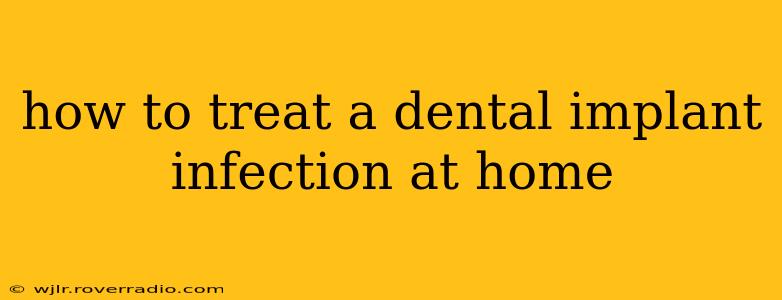A dental implant infection, or peri-implantitis, is a serious condition requiring professional dental care. While home remedies can help manage symptoms and support professional treatment, they cannot cure the infection. Never attempt to self-treat a suspected dental implant infection without consulting a dentist. Ignoring the problem can lead to implant failure and more extensive health issues.
This guide provides information on managing discomfort and supporting your dentist's treatment plan, but it is not a substitute for professional medical advice.
What are the Signs of a Dental Implant Infection?
Recognizing the symptoms is crucial for timely intervention. Common signs include:
- Swelling and redness: Around the implant site and gums.
- Pain: A persistent ache or throbbing pain.
- Bleeding: Slight bleeding during brushing or spontaneously.
- Pus: A whitish or yellowish discharge around the implant.
- Loose implant: The implant may feel loose or wobbly.
- Bad breath: Persistent bad breath (halitosis) that doesn't improve with brushing.
- Changes in gum color: The gums may appear darker or more inflamed.
Can I Treat a Dental Implant Infection at Home?
While you cannot cure a dental implant infection at home, you can take steps to manage symptoms and support your dentist's treatment. These measures should always be in conjunction with professional dental care.
What Home Remedies Can Help Manage Symptoms?
- Saltwater Rinse: Rinsing your mouth with warm salt water (1/2 teaspoon salt in 8 ounces of warm water) several times a day can help reduce inflammation and remove debris.
- Gentle Cleaning: Use a soft-bristled toothbrush and gently brush the area around the implant, avoiding aggressive scrubbing.
- Ice Packs: Applying an ice pack to the swollen area for 15-20 minutes at a time can help reduce swelling and pain.
- Over-the-Counter Pain Relievers: Ibuprofen or acetaminophen can help manage pain and discomfort. Follow the dosage instructions carefully.
- Maintain Good Oral Hygiene: Continue with your regular oral hygiene routine, including brushing, flossing, and using an antiseptic mouthwash as directed by your dentist.
How Can I Prevent a Dental Implant Infection?
Prevention is key! Here's what you can do:
- Meticulous Oral Hygiene: Maintain excellent oral hygiene practices, including brushing twice daily, flossing daily, and using an antiseptic mouthwash as directed by your dentist.
- Regular Dental Checkups: Attend regular dental checkups and cleanings to allow your dentist to monitor the implant and address any potential problems early.
- Avoid Smoking: Smoking significantly increases the risk of dental implant infection and can hinder healing.
- Healthy Diet: A balanced diet contributes to overall health and supports immune function.
What Happens if I Suspect a Dental Implant Infection?
Schedule an appointment with your dentist immediately. Early diagnosis and treatment are critical for saving the implant and preventing further complications. Your dentist will conduct a thorough examination, and may take X-rays or other diagnostic tests to determine the extent of the infection. Treatment may involve antibiotics, cleaning and debridement of the infected area, or, in severe cases, surgical intervention.
Can a Dental Implant Infection Spread?
Yes, a dental implant infection can spread to surrounding tissues, potentially leading to more serious health problems. This highlights the importance of seeking professional dental care as soon as you suspect an infection.
What are the Long-Term Effects of Untreated Dental Implant Infections?
Ignoring a dental implant infection can result in:
- Implant failure: The implant may need to be removed.
- Bone loss: Infection can damage the bone surrounding the implant.
- Spread of infection: The infection may spread to adjacent teeth or other parts of the body.
Remember, this information is for general knowledge and does not replace professional medical advice. If you suspect a dental implant infection, contact your dentist immediately. Early intervention is crucial for successful treatment and preserving your dental implant.
